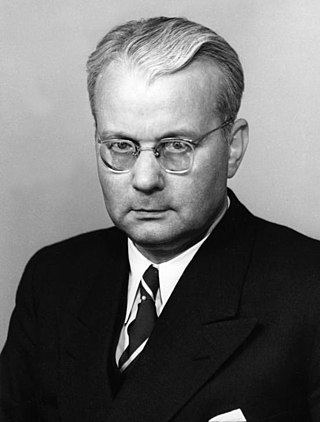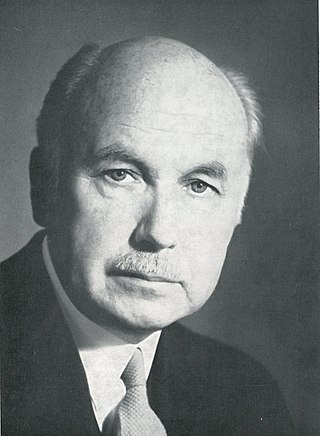
The Free Democratic Party is a liberal political party in Germany.

Germany is a democratic and federal parliamentary republic, where federal legislative power is vested in the Bundestag and the Bundesrat.

The vice-chancellor of Germany, unofficially the vice-chancellor of the Federal Republic of Germany, officially the deputy to the federal chancellor, is the second highest ranking German cabinet member. The chancellor is the head of government and, according to the constitution, gives this title of deputy to one of the federal ministers. It is common that the title is given to the major minister provided by the (smaller) coalition partner.

A ministry of finance is a ministry or other government agency in charge of government finance, fiscal policy, and financial regulation. It is headed by a finance minister, an executive or cabinet position.

The Federal Ministry of Finance, abbreviated BMF, is the cabinet-level finance ministry of Germany, with its seat at the Detlev-Rohwedder-Haus in Berlin and a secondary office in Bonn. The current Federal Minister of Finance is Christian Lindner (FDP).

Franz Blücher was a German politician and member of the German Parliament (Bundestag).

Thomas Dehler was a German politician. He was the Federal Republic of Germany's first Minister of Justice (1949–1953) and chairman of Free Democratic Party (1954–1957).

Reinhold Maier was a German politician and the leader of the FDP from 1957–1960. From 1946 to 1952 he was Minister President of Württemberg-Baden and then the 1st Minister President of the new state of Baden-Württemberg until 1953.

Dirk Niebel is a German politician. From 2009 to 2013, he served as Federal Minister of Economic Cooperation and Development. From 2005 to 2009, he was secretary general of the FDP.

The Federal Ministry for Economic Affairs and Climate Action, abbreviated BMWK, is a cabinet-level ministry of the Federal Republic of Germany. It was previously known as the "Ministry of Economy". It was recreated in 2005 as "Ministry of Economics and Technology" after it had previously been merged with other ministries to form the Federal Ministry for Economics and Labour between 2002 and 2005. The ministry is advised by the Council of Advisors on Digital Economy.
Fritz Neumayer was a German politician. He was Federal Minister of Building from 1952 to 1953, and Federal Minister of Justice from 1953 to 1956.

The First Adenauer cabinet was the 1st Government of Federal Republic of Germany in office from 20 September 1949 until 20 October 1953. It was the first democratically-elected German cabinet after World War II. The cabinet was formed after the 1949 elections. Konrad Adenauer reached an agreement on a coalition with the Free Democratic Party (FDP), German Party (DP) and his Christian Democratic Union (CDU) together with their Bavarian sister party Christian Social Union (CSU), setting the stage for Adenauer to become the first Chancellor of Germany. Franz Blücher (FDP) served as Vice-Chancellor of Germany and Federal Minister of Matters of the Marshall Plan. The cabinet was succeeded by the Second Adenauer cabinet.

Werner Hoyer is a German economist and politician of the Free Democratic Party (FDP) who served as President of the European Investment Bank (EIB) between 2012 and 2023.

The German Party was a national-conservative political party in West Germany active during the post-war years. The party's ideology appealed to sentiments of German nationalism and nostalgia for the German Empire.

Irmgard Schwaetzer is a German politician of the Free Democratic Party (FDP) and a Protestant church official. From 2013 to 2021, she chaired the Synod of the Protestant Church in Germany (EKD). She is the central founding figure, as well as honorary chairwoman, of the Liberal Women.

The Archive of Liberalism of the Friedrich Naumann Foundation for Freedom in Gummersbach, North Rhine-Westphalia has been in existence since 1968 and is thus the oldest of the six archives of political foundations in Germany.

Paul Luchtenberg (1890–1973) was a German cultural scientist, educator and politician for the Free Democratic Party, as well as Culture Minister for North Rhine-Westphalia.

Volker Wissing is a German lawyer, former judge and politician of the liberal Free Democratic Party (FDP) who has been serving as the party's General Secretary since 2020, and as Minister for Transport in the federal government under Chancellor Olaf Scholz since 2021. He previously was the Deputy Minister-President of Rhineland-Palatinate in the state government under Minister-President Malu Dreyer from 2016 to 2021 and a member of the German Parliament from 2004 to 2013.

The Federal Ministry for Housing, Urban Development and Building, abbreviated BMWSB, is a cabinet-level ministry of the Federal Republic of Germany. It is headquartered in Berlin. The current minister is Klara Geywitz, of the Social Democratic Party. The Federal Ministry existed between 1949 and 1998 and was re-established in December 2021.
This page is based on this
Wikipedia article Text is available under the
CC BY-SA 4.0 license; additional terms may apply.
Images, videos and audio are available under their respective licenses.

















